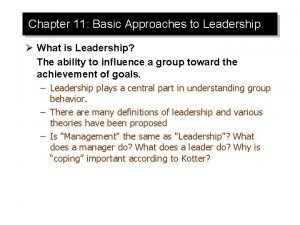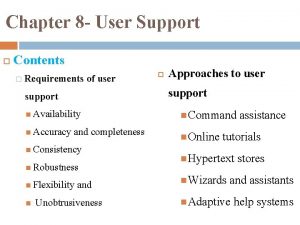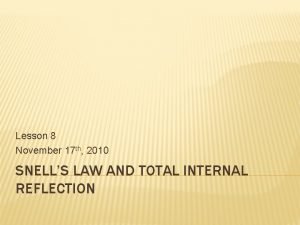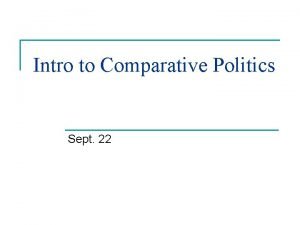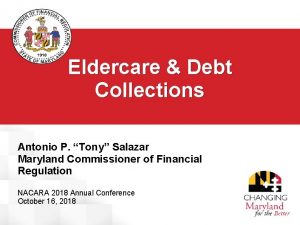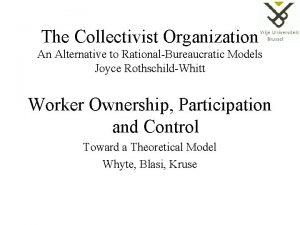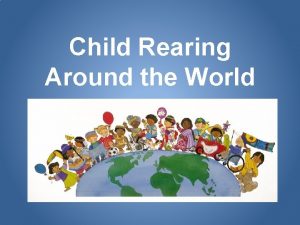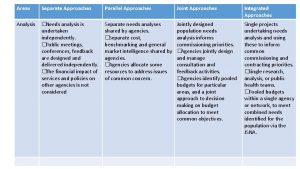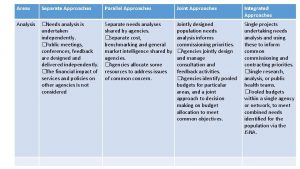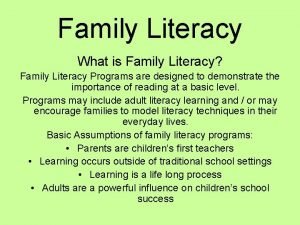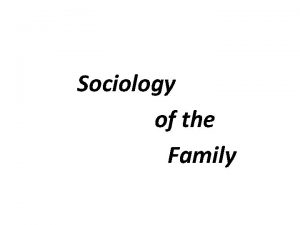Individualist vs Collectivist Approaches to Family Eldercare from






























- Slides: 30

Individualist vs. Collectivist Approaches to Family Eldercare from a Cross. Cultural Perspective Kyong Hee Chee, Ph. D. Associate Professor Department of Sociology Texas State University

Topics Individualism vs. Collectivism Ethnic Differences in Family Eldercare Dementia Caregiving Family Orientations & Eldercare Strategies

Consider this scenario: You have to transfer three times on public transportation to get from where you live to your office. Because of the time and inconvenience of taking public transportation, you have tried very hard to save money to buy a car before winter. However, your parents have a need for money and ask you to give them the money you have saved.

Individualism vs. Collectivism Individualism Self-reliance with competition Less concern for the ingroup Detached from the ingroup Collectivism Subordination of own goals to ingroup goals More concern for the ingroup Paying attention to the views of the ingroup Triandis et al. 1988

Individualism vs. Collectivism Japanese vs. U. S. younger adults More collectivist in general Feel more honored when an ingroup member is honored More attention to the views of coworkers Less concern for ingroups in general Less attention to neighbors & religious views Feel less similar to neighbors & religious ingroups Less committed to help neighbors Triandis et al. 1988

Individualism vs. Collectivism Japanese older vs. younger adults Feel more similar to ingroups Older females, in particular Puerto Ricans vs. Japanese Similar to Japanese in general But, more concerned for ingroups Puerto Ricans vs. U. S. Pay less attention to the views of ingroups Triandis et al. 1988

Individualism vs. Collectivism People in U. S. & Canada vs. others More individualistic Not much different from Australians, Germans, or Indonesians But, less individualistic than Puerto Ricans or Latin Americans Less collectivistic than Europeans or Chinese But, not lower than Japanese or Koreans More collectivistic than New Zealand, France, Singapore, Tanzania, Egypt, Costa Rica, & Venezuela Oyserman et al. 2002

Individualism vs. Collectivism Within the U. S. European Americans with lower collectivism than African Americans, Latino Americans, or Asian Americans But, similar in seeking advice from others Cannot assume higher collectivism & lower individualism for all East Asians than Americans Especially for Koreans or Japanese Oyserman et al. 2002

Ethnic Differences in Family Eldercare Filial piety Familismo 孝 耂(aging) + 子 (son) 효 “Fictive kin” (Stack 1983)

What should Wang Hong do? Wang Hong has to transfer three times on public transportation to get from where he lives to his office. Because of the time and inconvenience of taking public transportation, he has tried very hard to save money to buy a car before winter. However, his parents have a need for money and ask him to give them the money he has saved.

What should Shanequa do? Shanequa has to transfer three times on public transportation to get from where she lives to her office. Because of the time and inconvenience of taking public transportation, she has tried very hard to save money to buy a car before winter. However, her parents have a need for money and ask her to give them the money she has saved.

What should Alejandra do? Alejandra has to transfer three times on public transportation to get from where she lives to her office. Because of the time and inconvenience of taking public transportation, she has tried very hard to save money to buy a car before winter. However, her parents have a need for money and ask her to give them the money she has saved.

Ethnic Differences in Family Eldercare Small differences in caregiver characteristics Ethnic minorities vs. Whites Younger Less likely to be a spouse Less likely to be married Less likely to report higher levels of education Less likely to report higher levels of income Caring for more hours per week A larger number of caregiving tasks Stronger beliefs in filial obligation Higher levels of informal social support Higher levels of subjective well-being More likely to perceive uplifts of caregiving Pinquart & Sorensen 2005

Ethnic Differences in Family Eldercare African-American care recipients more physically & cognitively impaired than White care recipients The number of caregiving tasks much higher for African-American & Asian than White caregivers Hispanic caregivers provided care for a longer period than non-Hispanic Whites Asian caregivers provided care for a shorter period than Whites Pinquart & Sorensen 2005

Ethnic Differences in Family Eldercare Asian caregivers used less formal support than White non-Hispanics & Asian Americans reported a lower relationship quality with the care recipient than Whites African Americans more likely to use cognitive coping than Whites Asian Americans more likely to use emotion-focused coping Pinquart & Sorensen 2005

Ethnic Differences in Family Eldercare African Americans reported lower caregiver burden than Whites caregivers African Americans less depressed than White caregivers Hispanic & Asian-American caregivers more depressed than Non-Hispanic Whites Afican Americans & Hispanics showed more perceived uplifts of caregiving than Whites Pinquart & Sorensen 2005

Ethnic Differences in Family Eldercare All ethnic minority caregivers with lower levels of physical health than Whites caregivers Pinquart & Sorensen 2005

Dementia Caregiving Whites More likely to be spouses than minorities African Americans More likely to be extended relatives Latino Americans More likely to be adult children Janevic et al. 2001

Dementia Caregiving Psychological distress Lower for African Americans than Whites More anger & embarrassment for Korean American adult children Appraisal of stressfulness African Americans consider caregiving less stressful than Whites Janevic et al. 2001

Dementia Caregiving Coping African Americans used less approach & avoidance coping than Whites Koreans used less coping strategies than U. S. caregivers Chinese used more cognitive confronting (“Just accepted it”) & behavioral distancing/social support (“Asked someone for advice”) than U. S. caregivers Both Irish Americans & Latinos invoked the notion of homelands Idealizing Irish culture Tragic life histories & difficult access to services Janevic et al. 2001

Dementia Caregiving Social support Non-Whites may not have more informal support Service utilization Need (patient’s functional status) led to discretionary service use (respite use & meal service) for Latinos more than African Americans & Whites No differences in Alzheimer’s Association service use between African Americans & Whites Janevic et al. 2001

Dementia Caregiving Meaning of dementing illness AD as a “loss of identity” or “loss of self” among Irish American caregivers Chinese Americans view it with less fear & agitation than others, focusing on filial duties Puerto Rican caregivers tend to attribute it to past tragedies Janevic et al. 2001

Dementia Caregiving Implications Racial, ethnic, national, & cultural group differences The stress process Psychosocial outcomes Factors related to service utilization The paradigm of the “primary caregiver” vs. the inclusiveness of the entire family system Caregiving conflicts for immigrants due to different levels of acculturation Janevic et al. 2001

Family Orientations & Eldercare Strategies “On a day-today basis I don’t do a whole lot [of caregiving] because I have my life, too… If she gets to that stage where she doesn’t have any kind of a memory at all, I think I would try to make sure she was in a good caring facility… I woud not want to quit my part-time job just to take care of her. I don’t feel that’s my responsibility. ” Pyke & Bengrtson 1996, p. 384

Family Orientations & Eldercare Strategies “I know I wouldn’t go to my daughter’s house because I wouldn’t put her through that… Just because I like my daughter, and I don’t want her to have to be burdened with me. Because I want her to keep on liking me, and if they have to take care of you, you never know if they are going to like you or not, and I think she likes me. ” Pyke & Bengrtson 1996, p. 384

Family Orientations & Eldercare Strategies “Maggie, 63, … lives with and cares for her 94 -year-old, memory-impaired mother. Her 70 -year-old sister stays with her mother during the day while Maggie works for pay. Maggie moved from the Midwest to her parents’ home in southern California 16 years ago following a divorce. Her caregiving role also grew out of that coresidence and began with her father, for whom she cared until death. ” Pyke & Bengrtson 1996, p. 384

Family Orientations & Eldercare Strategies “My own concern is what is all this doing to my mother? Is this aging her faster than she should be? Or, will she have health problems later due to this excess caregiving and keeping up a work schedule on top of it? . . . ” “…she really should have somebody with her or [be] under some supervision 24 hours a day… We talked…to our parents, and they were like, ‘I don’t want to discuss this. ’” Pyke & Bengrtson 1996, p. 386

Family Orientations & Eldercare Strategies Factors affecting caregiving systems Family size Gender Care intensity & time availability Social class Pyke & Bengrtson 1996

Family Orientations & Eldercare Strategies Implications Individualists More affected by caregiving Need public support for eldercare Collectivists Better at absorbing additional caregiving Make fewer demands on government services Pyke & Bengrtson 1996

Thank you!
 Examples of individualism
Examples of individualism Family eldercare
Family eldercare Rugged individualist archetype examples
Rugged individualist archetype examples Individualistic culture definition
Individualistic culture definition Collectivist society definition
Collectivist society definition Eldercare.acl.gov
Eldercare.acl.gov Periodic table staircase
Periodic table staircase Binuclear family vs blended family
Binuclear family vs blended family Conjugal family
Conjugal family Basic approaches to leadership
Basic approaches to leadership Approaches to message authentication
Approaches to message authentication Corpus approaches to discourse analysis
Corpus approaches to discourse analysis Approaches to user support
Approaches to user support 7 approaches to psychology
7 approaches to psychology Biodiversity tends to decrease nearer the equator
Biodiversity tends to decrease nearer the equator Research approach means
Research approach means Self-help approach in community development examples
Self-help approach in community development examples What is virtue ethics
What is virtue ethics Demographic trends affecting human resource management
Demographic trends affecting human resource management Pendekatan penilaian adalah
Pendekatan penilaian adalah A ray of light approaches a jar of honey
A ray of light approaches a jar of honey Two approaches in corporate governance
Two approaches in corporate governance General pricing approaches
General pricing approaches Political comparative and superlative
Political comparative and superlative Approaches meets masters
Approaches meets masters Historical approach
Historical approach Ib approaches to teaching
Ib approaches to teaching What is teacher dominated approach
What is teacher dominated approach Planning a software project
Planning a software project Approaches to formulation of accounting theory
Approaches to formulation of accounting theory A comparison of approaches to large-scale data analysis
A comparison of approaches to large-scale data analysis









